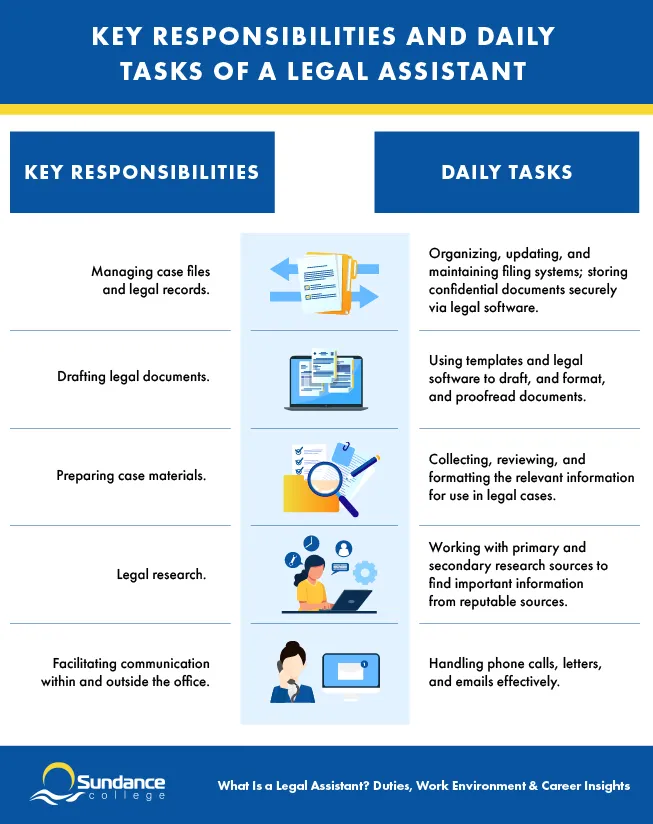Blog / What Is a Legal Assistant? Duties, Work Environment & Career Insights
What Is a Legal Assistant? Duties, Work Environment & Career Insights

Professional Legal Assistant Diploma
- Legal Assistant
- Legal Secretary
- Legal Administrative Assistant
Table of Contents
Legal assistants play an essential role in keeping legal matters organized, accurate, and moving forward. Whether it’s conducting research, drafting documents, or managing client communication, their work is essential legal system support.
In this article, get a closer look at what a legal assistant in Canada does by exploring their daily duties, where they work, the tools they use, and why this career can offer job security, strong earning potential, and career growth.
Listen to: What Is a Legal Assistant? Duties, Work Environment & Career Insights
Defining the Legal Assistant Role
What is a legal assistant? A legal assistant maintains the organization, accuracy, and efficiency of legal processes. The legal assistant role helps move legal matters forward by:
- Organizing case files
- Drafting legal paperwork
- Preparing case materials
- Conducting research
- Managing internal and external communications
As a legal assistant, your foundation in family law, real estate, civil litigation, or corporate law can lead to opportunities in several different work environments. You could work in a:
- Crown prosecutor’s office
- Government legal department
- Real estate or mortgage firm
- Corporate legal team
- Small private practice
By conducting detailed research, keeping documents organized and current, and preparing accurate case materials, you will keep the legal process on track.
Key Responsibilities and Daily Tasks

These legal assistant duties will define what you’re expected to oversee or achieve in your role, in any legal setting.
You’ll be responsible for:
Managing Records and Legal Filing Systems
By keeping client files, evidence logs, and case documents well-organized (and confidential), you will help prevent delays and keep legal teams efficient and compliant.
Drafting Legal Documents
When drafting documents for use in legal proceedings, you’ll need to follow the legal standard for formatting them. These are important matters in your hands, so you’ll need to make sure they’re finalized correctly and filed on time.
Preparing Case Materials
When court dates approach, your role will shift into preparation mode—assembling documents, organizing notes, and making sure everything is ready and in place.
Conducting Legal Research
By searching correctly, recognizing trustworthy sources, and finding relevant facts in a sea of search results, you will provide the team with the trusted information they need, when they need it.
Communicating Professionally
By communicating clearly and professionally with colleagues, clients, and courts, you will ensure that critical information is accurately shared and deadlines are consistently met.
These key responsibilities will guide your overall contribution to the legal team and keep everything running efficiently.
Work Environments
When you start exploring legal assistant jobs, you’ll find that the role isn’t limited to one type of law office. In fact, your day-to-day work could look very different depending on where you work.
Here’s a look at where legal assistants work, and how each environment offers a unique experience:
Crown Prosecutor’s Office
Do you know what’s needed to prepare for a criminal trial? Before entering a courtroom, court briefs and exhibit books are prepared; disclosure managed, and witnesses coordinated. If you’d like to be involved in prosecuting criminals, working at a Crown Prosecutor’s office is where your in-depth knowledge of criminal law can shine through.
Government Legal Department
Working in a government legal office involves public policy, bylaw enforcement, civil litigation, and regulatory matters. You’ll help prepare and manage legal documents such as:
- Contracts
- Affidavits
- Enforcement notices
You’ll assist with hearings and court filings, organize case files, and coordinate with internal departments like planning or public works to keep legal matters moving.
This workplace will be the perfect fit if you’re interested in work that directly impacts communities and public services.
Real Estate or Mortgage Firm
In this setting, you’ll help clients buy, sell, or refinance starter homes, move-up homes, forever homes, and more. You’ll draft and review key documents such as:
- Agreements of Purchase and Sale
- Mortgage instructions
- Land transfer forms
- Discharge statements
- Statements of Adjustments
You’ll also conduct title searches using land title systems, prepare trust ledgers, and coordinate with realtors, lenders, and title offices to make sure everything is ready for closing. From verifying ownership to tracking deadlines, your role will be essential to keeping real estate deals accurate, compliant, and on track.
Corporate Legal Department
Corporate legal teams operate within companies, handling everything from contracts and compliance to intellectual property and internal investigations. As a legal assistant in a corporate environment, you’ll often collaborate with HR, finance, and executive leadership to coordinate legal documentation and clarify internal policies.
You’ll assist in-house counsel by drafting and reviewing documents like:
- Non-Disclosure Agreements (NDAs)
- Employment contracts
- Service agreements
- Corporate resolutions
Also, you’ll maintain corporate records, organize minute books, assist with regulatory filings, and help track legal deadlines. Your role will blend law and business, showcasing how legal decisions influence strategy, risk, and a company’s overall success.
Small Private Law Firm
Smaller firms often take on a mix of legal areas like family law, wills and estates, or civil litigation, so your role will be hands-on and varied. You’ll take on tasks such as:
- Preparing court forms
- Drafting contracts or wills
- Managing client files
- Scheduling court dates
- Administrative functions like invoicing and calendar management
With fewer staff, you’ll work closely with lawyers and clients, taking part in nearly every stage of a case. Firms like this give you more responsibility early on, which can build your skills faster than in larger firms. It’s the ideal work environment for learning, growing, and solidifying your value as a core member of the legal team.
Each of these legal work settings offers something unique. Whether it’s high-stakes criminal cases or the deal-making pace of real estate, you’ll find your role will be essential no matter where you’re employed.
Tools and Technologies Used
In today’s legal offices, legal assistants use specialized tools and technology as part of their everyday work. You’ll use legal software tools to search for, organize, and analyze documents and transcripts when preparing a case. Learning industry-standard software like PCLaw, which can integrate other software and will expose you to all areas of law that you may choose to work in.
Here are a few examples of legal assistant technology in action:
- Document management systems: You’ll use secure platforms to organize, store, and retrieve legal files, helping maintain accuracy, confidentiality, and quick access to the documents lawyers need.
- Legal practice management software: These programs will let you manage tasks like scheduling, billing, time tracking, and document storage all in one place. When handling multiple responsibilities, this will help you stay organized and work more efficiently.
- Document assembly and automation tools: You’ll work with tools that allow you to create templates and generate accurate legal documents faster, helping maintain consistent formatting and save valuable time.
- Real-time collaboration tools: As a legal assistant, you’ll use software that lets you work with lawyers and colleagues on documents at the same time for faster feedback and keeping edits organized, even remotely.
- Redaction and data privacy tools: Unlike document management systems, this tool will help you securely remove personal or sensitive information from documents before they’re shared. It’s an essential piece of tech you’ll use to protect client privacy and meet legal standards.
Using tools and technologies, you’ll be able to handle daily tasks more efficiently. With proper training in legal software, you’ll excel in your role and keep legal processes moving forward.
Career Outlook in Canada

Legal assistants have a positive career outlook in the years to come. As more experienced legal professionals retire, firms are hiring legal assistants to take their place. At the same time, legal services are expanding due to new emerging areas of law, and technology changing workflows. Between 2024 and 2033, you’ll see over 24,000 legal assistant jobs open across Canada.
Legal Assistants are more in demand than ever in Canada, making now the ideal time to consider entering this field.
Legal assistant career growth typically comes through internal advancement or specializing in a specific area of law.
Internal advancement can usually be found in larger firms, where your experience can lead you to a supervisory role.
Another pathway to advancement is specializing in a specific legal field (e.g. real estate, litigation, and corporate law). While generalists are typically always seen as “support”, law firms are frequently looking to hire and promote professionals with in-depth knowledge in specific legal areas. As you gain experience in one area, you’ll develop an understanding of procedures, documents, and terminology specific to that area.
Amanda M., Sundance College’s Professional Legal Assistant instructor, encourages specialization for professional development:
“I always tell my students that once you find a legal area you’re passionate about, lean into it. That’s where you’ll find the most career growth.”
Finding a legal specialization that you’re not only well-versed in, but also passionate about, will put you in line for promotions and career growth.
As your skills and experience grow, so will your value to legal teams—and that will be reflected in your salary. As a legal assistant, depending on your experience and location, you could bring home as much as $72,289 per year.
With the right training, you could start building towards this rewarding career path within a year.
Legal assistants are indispensable to the legal field, providing crucial support through organization, document preparation, and client communication. With rising demand, strong salary potential, and opportunities to grow, it’s a strong, future-focused career choice.
Are you thinking about a career as a legal assistant? At Sundance College, you’ll get the skills needed to be a part of any legal team. From legal research to preparing case files, you’ll apply what you’ve learned and start building experience in a practicum placement before graduation.
If you want to learn more about how to become a legal assistant, explore how the training from our Legal Assistant Diploma Program can prepare you.
FAQ
Do you have more questions about legal assistants? Here are a few quick answers to frequently asked legal assistant questions.
-
What are the main duties of a legal assistant?
The main duties of a legal assistant include drafting legal documents, organizing and maintaining case files, conducting research, and managing internal and external communication.
-
What Is a Legal Assistant? Duties, Work Environment & Career Insights
A legal assistant is a key member of a legal team who helps lawyers with both administrative and legal support tasks.
Working in places like law firms, corporate legal departments, or government offices, legal assistants take care of duties such as preparing documents, managing schedules, and communicating with clients. Through their work, they help keep legal work organized and on track.
-
Where do legal assistants typically work in Canada?
In Canada, legal assistants typically work in a variety of settings, including crown prosecutor’s offices, government and city legal departments, real estate and mortgage firms, corporate legal teams, and small private law practices. These environments can vary in pace and focus, and they all rely on legal assistants to keep legal operations organized and efficient.
-
What kind of documents does a legal assistant prepare?
Legal assistants prepare a wide range of documents used in legal work. These can include letters, notices, real estate paperwork, and more. Part of the job is making sure everything is accurate, properly formatted, and follows legal procedures. They also check for spelling and grammar errors to make sure documents are presentable and ready to be filed or brought into court.
-
What makes a great legal assistant stand out?
The skills needed to become a successful legal assistant include strong organization, clear communication, and sharp attention to detail. Those who stand out can manage shifting priorities, meet tight deadlines, and work both independently and as part of a legal team, and handle sensitive information with professionalism.
-
Can legal assistants provide legal advice?
Legal assistants cannot provide legal advice, as they are not licensed to practice law. Unlike lawyers, they aren’t required to attend law school or pass the bar exam. While they may understand legal procedures and help prepare documents, they must always work under the supervision of a licensed lawyer and are not allowed to give clients legal guidance on their own.
Subscribe for more career advice
Blog Categories
Share on:
